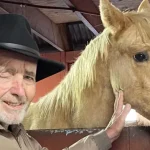
Authored by Sinead Murphy via The Brownstone Institute,
The UK Meteorological Office has just reported that we have enjoyed the hottest May on record.
Meanwhile, those of us who have lived in the UK during May have endured unseasonal cold and rain, and have complained to one another constantly about it.
Welcome to the age of abstraction, when lived experience is irrelevant and theoretical constructions carry the day – when what is deemed right and true is unmoored from what is actually happening here and now.
Over four years ago, Covid lockdowns staged a dramatic confiscation of present reality. The question is, did we ever get it back?
When the UK government ordered its first lockdown at the end of March 2020, the present reality was put on hold – businesses were shut, schools closed, social activities banned, and human interactions restricted.
Chaos and suffering inevitably ensued. But in the midst of the misery, there arose a new possibility.
With present reality in abeyance, we were freed of its reality check. And we began to indulge in a new and joyous expectancy, of a wonderful future to revive a glorious past.
‘We’ll meet again,’ Queen Elizabeth assured us, reprising in her words and presence a fondly recalled togetherness of the last world war and promising its restoration as if it had only just been paused – as if the decades-long decimation of community and family and individual had never happened, as if only a temporary order to Stay Home stood between us and a lost world.
This new possibility was tantalizing and quickly took hold of Middle England, the BBC-believing bastion of British Values, bent ever more implausibly on keeping calm and carrying on.
By 2020, this beleaguered demographic had been all but spent from spotting certainties and consolations on the horizon of Left and Right, to forestall a looming vertigo at elite interests dashing its hopes from above and state-reliant deplorables whose fate beckoned from below.
Middle England, front and centre of policy and institution, had long been demoralized by its present reality:
Consigned to jobs made ever more bullshit by the erosion of ambition and discipline; flip-flopping between debt and the dregs of old desires; addled by precarity and the virtuosity that survives it; overseeing the retreat of human sympathy everywhere and applying for relief to anxiously awaited festivals that never failed to disappoint.
Lockdowns’ suspension of this reality was in itself a great boon.
But greater still was what followed: unimpeded anticipation, of a happy tomorrow to follow a happy yesterday, in which all we would do because all we had done was Hug Granny and Play Whist and Toast Marshmallows and Sing Carols.
This was not nostalgia. It was infinitely more potent.
In nostalgia, the past is glorified as what is dead, as what is ‘vintage’ or ‘retro,’ as what can therefore only be remembered, however wistfully.
In lockdown, the past was reanimated, suddenly reframed as what would be again once universal cocooning came to an end.
Lockdowns relieved us of the one thing that had stood between us and fantastic recollections of Digging For Victory and Winning At Cribbage: present reality.
We were free now to regret the past, not hopelessly as what was lost and gone, but hopefully as what had just been put on hold and would soon resume once things got back to normal.
Yes, we still went through the present realities of 2020 and 2021. We ate food and washed clothes and logged on, and drank too much and fought too hard and lost our sense of purpose. But suddenly, all of that was in parentheses – not real at all, just for now.
Lockdowns achieved a transfer of the reality-effect from an inglorious present, sodden with disappointment, to a host of abstract ideas plundered from an invented past and projected to an inflated future.
Over four years on, we are no longer supported in our exemption from present reality by government orders to Shelter In Place. Present reality is returned to us, after a fashion.
It appears, however, that we do not want it back, that the lockdown mode continues to tantalize.
The reluctance with which many have relinquished their facemask has surely warned of this. As has the ongoing normalization of work-from-home.
But there is another and more insidious aspect to our cleaving to lockdowns’ suspension of present reality: our growing enthusiasm for theoretical constructions for which present reality is irrelevant.
During lockdowns, we plundered the almost-dead stock of yesteryear for content for the new mode of fond expectancy – abstract ideas of Dunkirk Spirit and Oh! What A Lovely War were hastily put abroad, adorned with Union Jack bunting, mugs of builders’ tea, allotment lemonade, and royal memorabilia.
But already before lockdowns ended, the stock of abstract ideas began updating.
The widely disseminated death of George Floyd launched a Black Lives Matter theme complete with its cartoon fist, and the rainbow of Gender was a seamless segway from the I Heart NHS refrain that had played ad nauseam for Covid.
As lockdowns receded, we were encouraged to extend our exemption from present reality by a growing fund of available abstractions: Climate, Health, Equity, Security, Safety, Identity…
These abstractions come with ready-made, insertable symbols: Black Lives Matter fists and Gender rainbows have been joined by Ukraine flags, Greta hastags, syringe icons, and wildfire emojis.
We trade these ideas as if they are old friends – unobjectionable, universally liked. We pin their cutesy signals to our messages and our lapels.
But these ideas are not our friends. They are quite the opposite. Because these ideas are not only theoretical, they are necessarily theoretical – by definition inapplicable to our lives and therefore indifferent to our flourishing.
The idea of ‘Environment’ is no more relevant to the rubbish blowing around our street than the idea of ‘Climate’ refers to the weather outside or the idea of ‘Health’ is concerned about how we feel or the idea of ‘Gender’ maps onto our biology.
Nothing about these ideas touches down in present reality. By trading them between ourselves – by posting them and tweeting them and dropping them into our casual conversations – we perform a contempt for present reality and a will to exempt ourselves from it, perpetuating the effect of lockdowns long after the lockdowns have ended.
Early Covid scepticism often argued that they invented Covid so they could have lockdowns. In retrospect, this was wrong. They invented lockdowns so they could have Covid. Not the disease of course, which was a concoction. The idea. Or rather, the kind of idea.
Covid is not just an abstract idea. It is an essentially abstract idea. It refers to something never heard of before – an asymptomatic disease, a disease for which present reality is necessarily irrelevant.
The Vaccine, which followed fast upon Covid and with great eclat, is another essentially abstract idea. With no significant effect on either transmission or infection, it is among us only as scorn for lived experience.
But Lockdown too is such an idea, describing a degree of distancing of people from one another and of cessation of the activities of life that could never be achieved in reality.
It is in this sense that lockdowns have defined our societies, escorting us from a time when present reality was relevant and required to be manipulated to a time when present reality is irrelevant and can be vetoed at will.
Lockdowns both launched an assault upon present reality by physically removing us from it and piloted, through the impossible idea of Lockdown, the cycle of abstraction that continues to transfer the reality effect from lived experiences to theoretical constructions.
In the end of it all, perhaps they invented lockdowns just to get Lockdown, imposing abstention from present reality to kickstart abstraction from present reality.
Of course, we still live out the realities obscured by their abstractions – beneath the pristine idea of Lockdown, there arose material conditions from which millions continue to suffer, not to mention the physical devastation unfolding under the idea of the Vaccine.
But somehow, all of that is in parentheses. The fallout from lockdowns is revealed in public inquiries and injuries from vaccines are reported in the media. Yet, it produces little effect – as if none of reality is real, but only a series of aberrations.
Exemption from present reality, begun so theatrically by lockdowns, continues unabated. What counts as vital circulates in the abstract, and lived experiences are sidelined as mere happenstance, hardly worth our notice at all.
Foucault’s most important insight is that you do not need to enslave people first in order then to exploit them. There are ways of exploiting people that also enslave them.
The disciplinary techniques of industrial production, with their unerring distribution of people in spaces and times, made people at once docile and useful.
In 1990, Deleuze updated Foucault’s insight to explain that you do not need to pacify people first in order to steal from them. There are ways of pacifying people by stealing from them.
The debt-based consumerism of post-industrial societies at once made people complacent with gratification and transferred their wealth to elite corporations.
By 2020, we had moved beyond the paradigms of production and consumption, even reproaching ourselves for overproducing and overconsuming.
By 2020, it was the age abstraction.
Lockdowns officially launched this new age in spectacular style. But quickly, lockdowns became unnecessary.
For, it emerged that you do not need to lock people away from present reality first in order to circulate unbelievable ideas.
If reality is sufficiently hostile and the ideas are sufficiently abstract, you can lock people away from present reality by the circulation of unbelievable ideas.
When we shake our heads to one another about Climate, or submit to screening for the good of our Health, or question our Identity, we exempt ourselves from present reality as effectively as if we were under orders to Stay Home.
And the powers that should not be can tell us anything they like, even that it’s sunny outside.
Authored by Sinead Murphy via The Brownstone Institute,
The UK Meteorological Office has just reported that we have enjoyed the hottest May on record.
Meanwhile, those of us who have lived in the UK during May have endured unseasonal cold and rain, and have complained to one another constantly about it.
Welcome to the age of abstraction, when lived experience is irrelevant and theoretical constructions carry the day – when what is deemed right and true is unmoored from what is actually happening here and now.
Over four years ago, Covid lockdowns staged a dramatic confiscation of present reality. The question is, did we ever get it back?
When the UK government ordered its first lockdown at the end of March 2020, the present reality was put on hold – businesses were shut, schools closed, social activities banned, and human interactions restricted.
Chaos and suffering inevitably ensued. But in the midst of the misery, there arose a new possibility.
With present reality in abeyance, we were freed of its reality check. And we began to indulge in a new and joyous expectancy, of a wonderful future to revive a glorious past.
‘We’ll meet again,’ Queen Elizabeth assured us, reprising in her words and presence a fondly recalled togetherness of the last world war and promising its restoration as if it had only just been paused – as if the decades-long decimation of community and family and individual had never happened, as if only a temporary order to Stay Home stood between us and a lost world.
This new possibility was tantalizing and quickly took hold of Middle England, the BBC-believing bastion of British Values, bent ever more implausibly on keeping calm and carrying on.
By 2020, this beleaguered demographic had been all but spent from spotting certainties and consolations on the horizon of Left and Right, to forestall a looming vertigo at elite interests dashing its hopes from above and state-reliant deplorables whose fate beckoned from below.
Middle England, front and centre of policy and institution, had long been demoralized by its present reality:
Consigned to jobs made ever more bullshit by the erosion of ambition and discipline; flip-flopping between debt and the dregs of old desires; addled by precarity and the virtuosity that survives it; overseeing the retreat of human sympathy everywhere and applying for relief to anxiously awaited festivals that never failed to disappoint.
Lockdowns’ suspension of this reality was in itself a great boon.
But greater still was what followed: unimpeded anticipation, of a happy tomorrow to follow a happy yesterday, in which all we would do because all we had done was Hug Granny and Play Whist and Toast Marshmallows and Sing Carols.
This was not nostalgia. It was infinitely more potent.
In nostalgia, the past is glorified as what is dead, as what is ‘vintage’ or ‘retro,’ as what can therefore only be remembered, however wistfully.
In lockdown, the past was reanimated, suddenly reframed as what would be again once universal cocooning came to an end.
Lockdowns relieved us of the one thing that had stood between us and fantastic recollections of Digging For Victory and Winning At Cribbage: present reality.
We were free now to regret the past, not hopelessly as what was lost and gone, but hopefully as what had just been put on hold and would soon resume once things got back to normal.
Yes, we still went through the present realities of 2020 and 2021. We ate food and washed clothes and logged on, and drank too much and fought too hard and lost our sense of purpose. But suddenly, all of that was in parentheses – not real at all, just for now.
Lockdowns achieved a transfer of the reality-effect from an inglorious present, sodden with disappointment, to a host of abstract ideas plundered from an invented past and projected to an inflated future.
Over four years on, we are no longer supported in our exemption from present reality by government orders to Shelter In Place. Present reality is returned to us, after a fashion.
It appears, however, that we do not want it back, that the lockdown mode continues to tantalize.
The reluctance with which many have relinquished their facemask has surely warned of this. As has the ongoing normalization of work-from-home.
But there is another and more insidious aspect to our cleaving to lockdowns’ suspension of present reality: our growing enthusiasm for theoretical constructions for which present reality is irrelevant.
During lockdowns, we plundered the almost-dead stock of yesteryear for content for the new mode of fond expectancy – abstract ideas of Dunkirk Spirit and Oh! What A Lovely War were hastily put abroad, adorned with Union Jack bunting, mugs of builders’ tea, allotment lemonade, and royal memorabilia.
But already before lockdowns ended, the stock of abstract ideas began updating.
The widely disseminated death of George Floyd launched a Black Lives Matter theme complete with its cartoon fist, and the rainbow of Gender was a seamless segway from the I Heart NHS refrain that had played ad nauseam for Covid.
As lockdowns receded, we were encouraged to extend our exemption from present reality by a growing fund of available abstractions: Climate, Health, Equity, Security, Safety, Identity…
These abstractions come with ready-made, insertable symbols: Black Lives Matter fists and Gender rainbows have been joined by Ukraine flags, Greta hastags, syringe icons, and wildfire emojis.
We trade these ideas as if they are old friends – unobjectionable, universally liked. We pin their cutesy signals to our messages and our lapels.
But these ideas are not our friends. They are quite the opposite. Because these ideas are not only theoretical, they are necessarily theoretical – by definition inapplicable to our lives and therefore indifferent to our flourishing.
The idea of ‘Environment’ is no more relevant to the rubbish blowing around our street than the idea of ‘Climate’ refers to the weather outside or the idea of ‘Health’ is concerned about how we feel or the idea of ‘Gender’ maps onto our biology.
Nothing about these ideas touches down in present reality. By trading them between ourselves – by posting them and tweeting them and dropping them into our casual conversations – we perform a contempt for present reality and a will to exempt ourselves from it, perpetuating the effect of lockdowns long after the lockdowns have ended.
Early Covid scepticism often argued that they invented Covid so they could have lockdowns. In retrospect, this was wrong. They invented lockdowns so they could have Covid. Not the disease of course, which was a concoction. The idea. Or rather, the kind of idea.
Covid is not just an abstract idea. It is an essentially abstract idea. It refers to something never heard of before – an asymptomatic disease, a disease for which present reality is necessarily irrelevant.
The Vaccine, which followed fast upon Covid and with great eclat, is another essentially abstract idea. With no significant effect on either transmission or infection, it is among us only as scorn for lived experience.
But Lockdown too is such an idea, describing a degree of distancing of people from one another and of cessation of the activities of life that could never be achieved in reality.
It is in this sense that lockdowns have defined our societies, escorting us from a time when present reality was relevant and required to be manipulated to a time when present reality is irrelevant and can be vetoed at will.
Lockdowns both launched an assault upon present reality by physically removing us from it and piloted, through the impossible idea of Lockdown, the cycle of abstraction that continues to transfer the reality effect from lived experiences to theoretical constructions.
In the end of it all, perhaps they invented lockdowns just to get Lockdown, imposing abstention from present reality to kickstart abstraction from present reality.
Of course, we still live out the realities obscured by their abstractions – beneath the pristine idea of Lockdown, there arose material conditions from which millions continue to suffer, not to mention the physical devastation unfolding under the idea of the Vaccine.
But somehow, all of that is in parentheses. The fallout from lockdowns is revealed in public inquiries and injuries from vaccines are reported in the media. Yet, it produces little effect – as if none of reality is real, but only a series of aberrations.
Exemption from present reality, begun so theatrically by lockdowns, continues unabated. What counts as vital circulates in the abstract, and lived experiences are sidelined as mere happenstance, hardly worth our notice at all.
Foucault’s most important insight is that you do not need to enslave people first in order then to exploit them. There are ways of exploiting people that also enslave them.
The disciplinary techniques of industrial production, with their unerring distribution of people in spaces and times, made people at once docile and useful.
In 1990, Deleuze updated Foucault’s insight to explain that you do not need to pacify people first in order to steal from them. There are ways of pacifying people by stealing from them.
The debt-based consumerism of post-industrial societies at once made people complacent with gratification and transferred their wealth to elite corporations.
By 2020, we had moved beyond the paradigms of production and consumption, even reproaching ourselves for overproducing and overconsuming.
By 2020, it was the age abstraction.
Lockdowns officially launched this new age in spectacular style. But quickly, lockdowns became unnecessary.
For, it emerged that you do not need to lock people away from present reality first in order to circulate unbelievable ideas.
If reality is sufficiently hostile and the ideas are sufficiently abstract, you can lock people away from present reality by the circulation of unbelievable ideas.
When we shake our heads to one another about Climate, or submit to screening for the good of our Health, or question our Identity, we exempt ourselves from present reality as effectively as if we were under orders to Stay Home.
And the powers that should not be can tell us anything they like, even that it’s sunny outside.
Loading…





